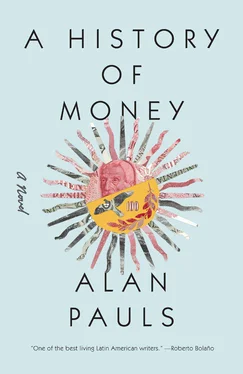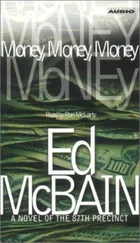She isn’t sick. She doesn’t want visitors (but she wouldn’t say no to cards: could he pass by the cab firm and give her new address to Mr. W.?). And no, she doesn’t need money. Her lotto winnings will last her a while (although what prize wouldn’t be peanuts compared with what she’s lost over years of playing?). Anyway, in circumstances that don’t bear recounting now but that still make her blush whenever she remembers them, the past, “a cruel tormentor, though still more generous than men,” was kind enough to regurgitate into her life her psychiatrist from twenty-five years ago, a pioneer of lysergic therapies who has cancer (though even bald she’s the most beautiful psychiatrist on earth) and whose last experiment is to assemble, or try to assemble — because not all of the candidates receive the proposal with quite the carefree delight his mother does, putting two or three things in a bag and taking the train straight to San Isidro — the victims of the treatments she gave in the seventies, all brilliant, promising young things broken by acid and psychotropics, and house them for free in her clinic, indefinitely, taking advantage of the fact that her last paying patient — a deaf, almost hundred-year-old woman, the only daughter of a Central European marchand whose painting collection she blows on the horse races — died a few months earlier, leaving a small (20 × 25) pastel by the young Matisse among her clothes, wrapped in paper from a Viennese pastry shop. She doesn’t need anything. She could swear she can’t even remember what needing is. The whole world has been reduced to nothing but tasteless idiocy. Only in a sanatorium can she do the only thing she knows how to do, the only thing she wants to do, the only thing she has time for now: wait for money to rain down on her.
First his father. Now his mother. He puts the key in the lock, shoves the door with his knee — it’s July, and the wood has swollen with the winter damp — and wonders whether clearing parents’ apartments is his purpose, his secret calling, his true mission in the world. In fact, the trash bags he brings with him are left over from the cleaning he didn’t have to do at his father’s apartment. When he goes in, he doesn’t know what he’ll do. Sell it, throw it all away, donate it, keep some of it? He hasn’t been given clear instructions. His mother’s fake postcard breaks off on the threshold of the matter, just after she’s asked him to take care of emptying and handing over the apartment before the end of the month, so that she doesn’t have to pay another month’s rent. “I’m being called,” she writes, as though they were talking on the phone — a type of chiasmus that she also uses the other way around, inserting epistolary tics in the most pedestrian phone conversations — and he thinks he can hear the soft, muffled-sounding peal of an evening bell ringing to the north of the city, through the trilling of birds and the stirring of treetops in the breeze from the river, for the benefit of half a dozen survivors dressed in expensive, white, worn-out clothing, who don’t know one another but who doubtless have common enemies, objects of curses and rancor, inviting them to come to dinner, or for a seven o’clock vermouth, or to play some complicated, drawn-out board game in whose dynamics lurk surprising psychological implications.
He picks up the mail that’s accumulated under the door. Promotional leaflets, local pamphlets, the Auto Club magazine (addressed to the owner of the apartment), a couple of out-of-date bills, among them the unopened electricity bill with the monstrous surcharge that inspired the last of her desperate requests for money. There’s nothing here that’s addressed to his mother, nothing in this whole glut of paper that uses her name. Neither does anything betray her in the strict, anodyne, perfectly impersonal order that reigns here, which now that he’s in his mother’s space for the first time he realizes is very similar to that of short-term rentals designed entirely around middling criteria — size, layout of furniture, decoration, appliances, materials — on which nobody could ever leave their mark, even if they set their minds to it, so indifferent is everything in them to the lives that might come and inhabit them.
Why, then, does he drop the mail? He’s disoriented; everything seems strange and precise, like the backdrop to a dream. There’s no sign that she’s been here, that much is true. But it’s not the meticulous, terrible sort of emptiness that comes with cleaning after a funeral, either, which renews a space only at the price of amplifying the echo of the tragedy that took place in it. After all, his mother has always boasted about her talent for making it seem as though she was never there. And anyway, she’s alive, more alive than ever in her sumptuous, damp, unheated exile, under rotting rafters that barely support the ceilings. Maybe that’s exactly what’s upsetting him: the idea that she’s saved herself, and that, saved, she’s farther from him than if she were dead. He looks around him. There’s not a thing out of place. He doesn’t know where to start. Instead of opening the blinds, he turns on all the lights. He doesn’t want air. He wants this scene to remain just as his mother left it. Maybe he thinks that if he keeps it closed off, without any contact with the outside world, it will gradually lose its air of civilization, will heat up, ferment, and rot — with him inside. There are no messages on the answering machine: only his mother’s voice feigning interest in receiving them, along with the long pauses she leaves between words as though she were talking to a foreigner or someone with learning difficulties, when in fact she’s just worried that she’s misunderstood the machine’s instruction manual and is doing something wrong. He opens drawers more or less at random, just to feel like he’s doing something, like the trip hasn’t been a waste. A few sheets of blank paper, two black pencils, a couple of envelopes, a card from a local real estate company. Worse than a hotel room.
He goes into the bedroom and flops facedown on the bed. He’d like to go to sleep and dream about something extravagant and enlightening — an adventure in a castle with vertiginous stairs, ping-pong tables, tortoises fornicating or headbutting each other, and a fog that rises up and ambushes it all — then wake up not knowing where he is and gradually come back around, resting his eyes on the things around him until he recognizes them and, finally, remembers everything. The feet of the nightstand, for example, with their stylized taper, like a knock-kneed cartoon heroine’s legs. The wire from the bedside lamp, which twists and runs out of view as though hiding. The painted baseboard, which has started to warp and will soon come away from the wall. A patch of gray carpet. A piece of yarn or cable tracing a red Z on the carpet. He picks it up: it’s one of the fine, flexible wires coated in plastic that people use to throttle bags and containers. He turns over and lies faceup, so that a blade from the ceiling fan is pointing directly at his chest, and only then does he notice the one personal touch that’s at odds with the place’s neutrality: that smell. Wafting in the background is an old, dirty perfume, ancient but not overpowering: the unmistakable aroma of objects that have passed through many hands, like the smell of worn-out secondhand clothes, for example, especially when they’ve been shut away in a closet for a long time. Or the smell of money.
There are no worn-out clothes in his mother’s closet. Or there are, but they’re all impeccable, recently washed, dresses and coats fresh from the dry cleaner’s and wrapped in plastic sheaths, pants ironed, shoes shining, everything hanging perfectly on the dark, wooden, slightly concave hangers that seem to be designed for shoulders and backs from another age, but which his mother is still willing to travel the length of the city to buy. The closet is full of clothes, full to bursting, so full that he wonders what could possibly have been removed, which two or three items she put in her suitcase the day she decided to admit herself to the clinic. When he looks down at the two rows of shoes covering the floor — the second on tiptoes with the heels resting against the wall to make a little more space — he sees something glinting, a sort of spark at the bottom of some low rain boots. He bends down — a raincoat caresses his head and messes up his hair as he enters a cloud of leather — and unearths a little packet of clear cellophane, like the ones that come with candy or party favors inside, tied at one end with a red wire like the one he found on the rug.
Читать дальше












